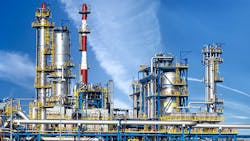PARIS--Two blasts at a petrochemical plant in France appear to have been a "criminal act" but investigators have been unable to pin down a motive, Interior Minister Bernard Cazeneuve said Wednesday.
"There is a probe underway. The first indications show that we are dealing with a criminal act, but no motive has been established," Cazeneuve told the lower house of parliament.
Separately, President Francois Hollande said terrorist attacks had been thwarted in recent days, though he made no link with the explosions at the petrochemical plant.
"This week, we stopped terrorist attacks which could have taken place," Hollande said on trip to Marseille alongside Mexican President Enrique Pena Nieto, adding that the interior ministry would give further details on Thursday.
A security source said that four people with an "Islamist profile" had recently been arrested on suspicion of planning an attack somewhere in France, without giving further details.
Officials discovered devices thought to have started the twin explosions at the Lyondellbasell chemical plant in the small town of Berre-l'Etang near Marseille in the early hours of Tuesday, which sparked huge fires but no one was hurt.
Two tanks full of petrol and naphtha -- a flammable liquid distilled from petroleum -- caught fire after the blasts and a thick cloud of black smoke was visible several kilometers away.
Prosecutors said an explosive device was found in a third tank, but had failed to trigger a major explosion.
France remains on edge after the Charlie Hebdo attacks in January where a trio of gunmen killed a total of 17 people starting with a massacre at the satirical magazine.
And last month, a man with suspected links to the Islamic State group spiked his boss's severed head onto the fence of a U.S.-owned gas factory.
Paris has tightened security around sensitive sites such as factories, calling for "maximum vigilance."
But experts have warned it is extremely difficult to defend against attacks on such sensitive sites.
"There is no such thing as zero risk," said Philippe Prudhon, a technical expert at the UIC union of chemical industries.
"If someone really wants to cause harm, it will be difficult to stop him or her. We have to realize that we have been in a fundamentally different environment for the past three years," said Prudhon.
Copyright Agence France-Presse, 2015
About the Author
Agence France-Presse
Copyright Agence France-Presse, 2002-2025. AFP text, photos, graphics and logos shall not be reproduced, published, broadcast, rewritten for broadcast or publication or redistributed directly or indirectly in any medium. AFP shall not be held liable for any delays, inaccuracies, errors or omissions in any AFP content, or for any actions taken in consequence.
